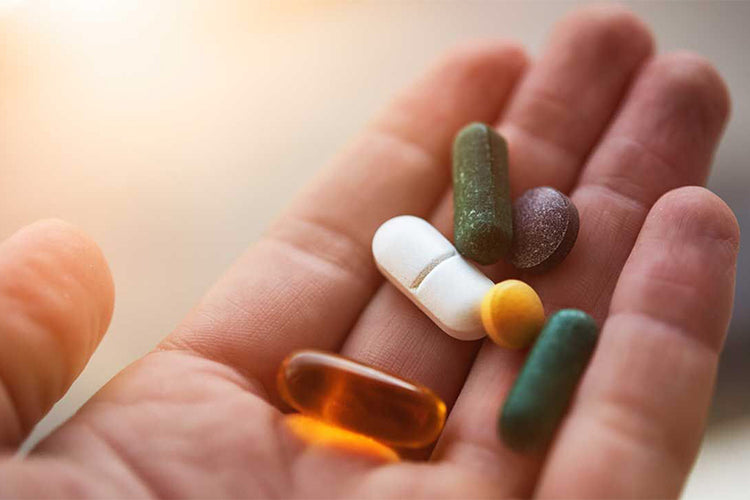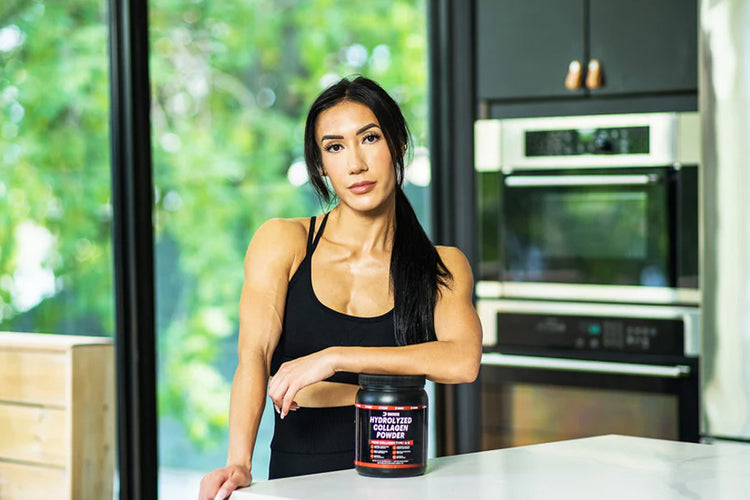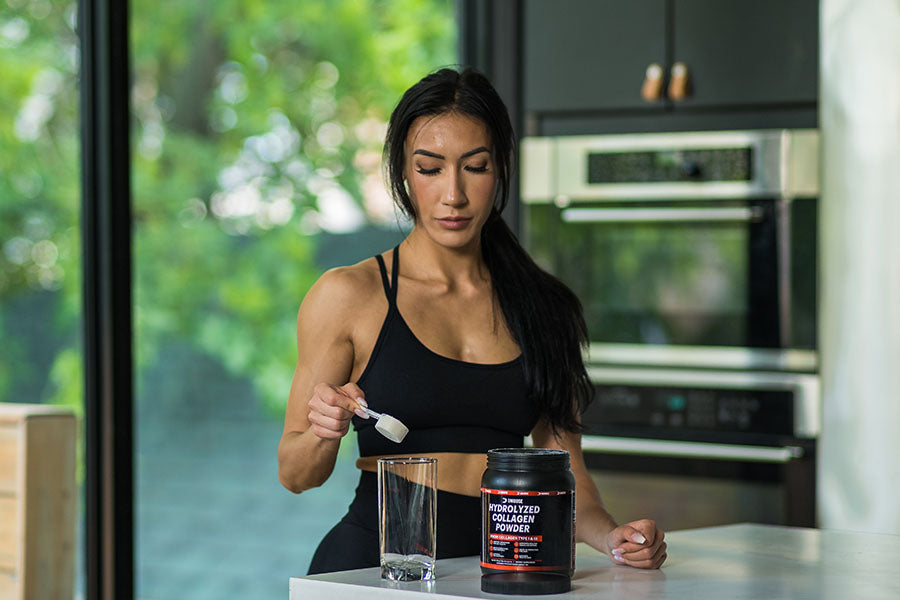You've probably heard about collagen supplements more times than you can count. They're the new 'it' product in the wellness and beauty industry, with celebrities and influencers endorsing them left, right, and center. But do these supplements really live up to the hype, or is it just another passing trend? Let's dive in.
Collagen, a protein found abundantly in our body, notably in skin, bones, and connective tissues, is hailed as the secret behind youthful, glowing skin. As we age, natural collagen production decreases, leading to wrinkles and other signs of aging. This is where collagen supplements come in, promising to replenish our diminishing collagen levels and restore our skin's youthful vitality.
Celebrities and influencers swear by these supplements, attributing their flawless skin and vibrant hair to their daily dose of collagen. From Hollywood A-listers to Instagram fitness gurus, collagen supplements are gaining traction for their alleged benefits.
In 2021,$2 billion worth of collagen supplements were sold, a figure that is expected to continue its upward trajectory in the future. But beyond the endorsements and the attractive packaging, do collagen supplements work?
Can they turn back the clock, giving us younger-looking skin, healthier hair, and stronger nails? Or are they just another expensive placebo in the ever-growing wellness market?
In this guide, we'll explore the science behind collagen supplements, their potential benefits, and drawbacks, and whether they're worth your investment.
We'll also hear from experts in the field and look at some of the latest research findings. So, buckle up and get ready for an enlightening journey into the world of collagen supplements.
Related Article: Collagen for Weight Loss: How Supplements May Help?
What Is Collagen?

Collagen is a protein that is the primary building block for your body's skin, muscles, bones, tendons, ligaments, and other connective tissues. It's like the glue that holds your body together, giving structure and strength to these vital parts of your body.
Imagine a busy construction site bustling with activity, and you'll get an idea of how collagen works. It's continuously at work, building, and rebuilding, ensuring your body remains strong and resilient.
But collagen isn't just about physical structure. It also is essential in maintaining skin elasticity, so youthful skin is often associated with high collagen levels. Our body's collagen production decreases as we age, contributing to wrinkles and sagging skin.
In addition to skin health, collagen is key for healthy joints. It's found in our bones, muscles, and blood, working tirelessly to keep us moving smoothly. Some people even take collagen as a nutritional supplement to help support joint health.
So, what does collagen do? It's more like, what doesn't it do? From providing the building blocks for many of our body's tissues to allowing these tissues to stretch and be flexible, collagen is crucial to our overall health and well-being.
"The production of collagen is a natural process carried out by our bodies, primarily through specialized cells known as fibroblasts. These cells require certain nutrients like vitamin C and zinc to assemble amino acids into collagen effectively."
Julia Zumpano (Registered Dietitian)
What Happens to Collagen as You Age?

As we age, our bodies not only produce less collagen but also break it down at a faster rate. This decline in collagen levels, particularly in the dermis (an inner layer of the skin), leads to sagging and wrinkling. Various factors can hasten this process.
Research indicates that smoking, alcohol consumption, exposure to UV light, and high sugar intake over time can reduce collagen production and weaken the protein, resulting in more pronounced wrinkles.
When the body cannot produce adequate collagen, related bodily functions can deteriorate. For instance, individuals with the genetic disorder known as Ehlers-Danlos syndrome may experience symptoms like overly soft and elastic skin, excessive bruising, and unstable joints due to this deficiency. Similarly, autoimmune diseases like lupus and rheumatoid arthritis can cause harm to collagen.
Forms of Collagen
There are 28 known types of collagen, but the most common ones are Types I, II, III, IV, and V.
Type I Collagen
It is the most abundant, making up about 90% of your body's collagen. It is primarily found in skin, bones, tendons, fibrous cartilage, connective tissue, and teeth.
Type II Collagen
It is mainly found in elastic cartilage, which provides flexibility and support to joints. It's essential for joint health and can be found in high amounts in joint supplements.
Type III Collagen
Type III works hand in hand with Type I collagen and is found in large quantities in the intestines, muscles, blood vessels, and the uterus. It contributes to the structure and elasticity of tissues.
Type IV Collagen
It plays a vital role in forming basal lamina, a layer of extracellular matrix secreted by the epithelial cells.
Type V Collagen
This one aids in the formation of cell surfaces, hair, and placenta.
In addition to these natural forms, collagen can also be taken as a supplement, usually in three different forms, such as
- Hydrolyzed collagen: Also known as collagen hydrolysate or collagen peptides, it is broken down into tiny protein fragments called amino acids.
- Gelatin: Its collagen is only partially broken into amino acids.
- Raw: In raw, or undenatured forms, the collagen protein remains intact.
Collagen supplements predominantly come from animal sources such as pigs, cows, and fish. The composition of these supplements can vary, but they usually contain collagen types I, II, III, or a combination of the three. Research indicates that the body may absorb hydrolyzed collagen more effectively.
Regardless of the form, all collagen is broken down into amino acids during digestion. These amino acids are then absorbed and utilized to synthesize collagen or other necessary proteins in your body.
It's important to note that your body naturally produces collagen using amino acids derived from the proteins you consume. However, some studies suggest supplementing with collagen might boost its production and provide unique benefits.
Related Article: Foods Containing the Nine Essential Amino Acids That Must Be in Your Diet
Does Science Support Collagen Supplements?
Board-certified dermatologist Sonya Kenkare claims that there is insufficient data to support her recommendation of collagen supplements. Her hairstylist suggested collagen to her to stop her hair from falling out after she gave birth to her child a few months ago. According to her:
"I haven't done it because there isn't a lot of evidence. I've seen a lot of people use it, and I frequently tell them that there is no evidence to suggest that it is having any effect at all."
So, the question remains do collagen supplements work? Let’s dig deeper into this matter and see whether scientific evidence supports the claim!
Supplements May Work for Skin and Joints
Evidence suggests that collagen supplements do work to reduce wrinkles and joint pain to a greater extent.
Skin
Collagen types I and III are vital skin components, offering strength and structure. While your body naturally produces collagen, research suggests that the collagen content in the skin may decrease by about 1% each year, a factor contributing to aging skin.
Preliminary studies indicate that supplement intake may elevate collagen levels in your skin, diminish wrinkles, and enhance skin elasticity and hydration. In one study involving 114 middle-aged women, daily consumption of 2.5 grams of Verisol - a hydrolyzed collagen type I brand - over 8 weeks led to a 20% reduction in wrinkle volume.
In another study with 72 women aged 35 years or older, a daily intake of 2.5 grams of Elasten - a brand of hydrolyzed collagen types I and II - for 12 weeks resulted in a 27% reduction in wrinkle depth and a 28% increase in skin hydration.
Though these early studies show promise, more research is necessary to ascertain the effectiveness of collagen supplements for skin health and to identify the most beneficial ones.
Joints
Collagen type II is primarily found in cartilage, a protective cushion between joints. Osteoarthritis (OA), a common condition, involves the deterioration of the cartilage between joints. This can result in inflammation, stiffness, and pain, leading to decreased functionality, particularly in the hands, knees, and hips.
A few studies propose that different kinds of collagen supplements may assist in alleviating joint pain associated with OA. In two separate studies, participants with OA who consumed 40 mg of UC-II - a raw type-II collagen brand - daily for up to six months experienced reduced joint pain and stiffness.
In another study, taking 2 grams of BioCell - a hydrolyzed type-II collagen brand - daily for 10 weeks led to a 38% reduction in joint pain, stiffness, and disability scores among individuals with OA.
It's significant to mention that the manufacturers of UC-II and BioCell not only funded but also assisted in conducting their respective studies, which may impact the results.
Lastly, collagen supplements might also help relieve joint pain related to exercise and rheumatoid arthritis, although more research is required in this area
Collagen Supplements for Bones, Muscles, and Other Benefits

There is little information on the effects of collagen supplements on bone, muscle, and other regions, despite the potential advantages being intriguing.
Bone Health
Collagen, particularly type I, constitutes a significant proportion of bone composition. Because of this, it is suggested that collagen supplements may help protect against osteoporosis - a condition characterized by weak, brittle bones that are prone to fractures.
In one study involving 131 postmenopausal women, a daily intake of 5 grams of a hydrolyzed collagen supplement known as Fortibone for a year resulted in a 3% increase in spinal bone density and an approximately 7% rise in femur bone density.
Despite these findings, more comprehensive human studies are required to confirm whether collagen supplements can enhance bone mass and prevent bone loss.
Building Muscle
Like all protein sources, collagen supplements promote muscle building when used with resistance training.
53 older men participated in a trial where, after three months of resistance exercise, those who took 15 grams of hydrolyzed collagen grew considerably more muscle than those who received a non-protein placebo.
Collagen and non-protein post-workout supplements demonstrated comparable results in a different trial, including 77 premenopausal women.
These findings imply that collagen supplements might be more effective than consuming no protein after exercise. It has yet to be established whether collagen supplements are better for growing muscle than other protein sources.
However, you can take a genuine good-quality muscle-building supplement like DMoose Creatine Monohydrate Powder. It's not just another supplement on the shelf - with a laundry list of benefits ranging from increased strength to faster recovery times, this powder truly stands apart.
Whether trying to build those bell-bottom jeans or rock-solid abs, this product will help you get there faster. Plus, with amino acid residues to fuel your body through even the most intense workouts, you'll set yourself up for success from start to finish.
Other Benefits
Since collagen makes up a large portion of the body, taking it as a supplement offers several potential advantages.
Many, though, have not undergone thorough investigation. A few studies examined the effects of collagen supplementation on the following:
Overall, more data is required in these fields.
Best Collagen Supplement

Where there are dozens of collagen powders for skin and other areas, we recommend getting DMoose Hydrolyzed Collagen Powder. Why? First, it is a hydrolyzed supplement containing Type I and III collagen, which we discussed previously are the best forms of collagen effective for skin and joint issues.
Second, it is made of 100% organic ingredients, so your health is not compromised. The collagen is sourced from cow’s bovine with an addition of 9 g proteins. This is amazing as it’ll help build those muscles besides fulfilling your protein requirements.
Third, you can easily dissolve the collagen powder in a hot or cold liquid, and it will not taste chalky at all. Impressive, right? So, why wait? Get your Hydrolyzed Collagen Powder now!
FAQs
1. How long does it take for collagen supplements to work?
Results vary from individual to individual, but typically, 4-8 weeks are enough for visible results.
2. Can pregnant and breastfeeding women take collagen?
It is usually suggested not to take supplements if you are pregnant or breastfeeding. However, consult a doctor if you want to give it a try.
3. Is it okay to take collagen every day?
Yes, you can take collagen daily. It’s considered safe. However, if you feel anything unusual is happening with the body, consult the doctor immediately.
4. What foods are high in collagen?
Eggs, dairy, fish, soy, and legumes are high in collagen
The Bottom Line
The world of collagen supplements is rich with promise but also riddled with questions. The potential benefits of these supplements, from improvement in skin health to potential boosts in bone and muscle strength, are certainly compelling. Yet, it's important to remember that much of the existing research is still in its infancy, with many studies conducted on animals or small human samples.
While some people report noticeable skin elasticity, joint comfort, and overall wellness improvements, others may not observe any significant changes. It's also crucial to consider dietary sources of collagen and overall nutrition before relying solely on supplements.
Remember, collagen supplements aren't a magic potion. They should be used as a part of a balanced lifestyle that includes a varied diet, regular physical activity, and adequate hydration. Always consult a healthcare professional before adding any new supplement to your regimen.
Reading List
Article Sources
- Bakilan, Fulya, et al. "Effects of Native Type II Collagen Treatment on Knee Osteoarthritis: A Randomized Controlled Trial." The Eurasian Journal of Medicine, vol. 48, no. 2, June 2016, pp. 95-101. PubMed, https://doi.org/10.5152/eurasianjmed.2015.15030.
- Bolke, Liane, et al. "A Collagen Supplement Improves Skin Hydration, Elasticity, Roughness, and Density: Results of a Randomized, Placebo-Controlled, Blind Study." Nutrients, vol. 11, no. 10, Oct. 2019, p. 2494. PubMed, https://doi.org/10.3390/nu11102494.
- Borumand, Maryam, and Sara Sibilla. "Daily Consumption of the Collagen Supplement Pure Gold Collagen® Reduces Visible Signs of Aging." Clinical Interventions in Aging, vol. 9, 2014, pp. 1747-58. PubMed, https://doi.org/10.2147/CIA.S65939.
- Carbone, John W., and Stefan M. Pasiakos. "Dietary Protein and Muscle Mass: Translating Science to Application and Health Benefit." Nutrients, vol. 11, no. 5, May 2019, p. 1136. PubMed, https://doi.org/10.3390/nu11051136.
- Chen, Di, et al. "Osteoarthritis: Toward a Comprehensive Understanding of Pathological Mechanism." Bone Research, vol. 5, 2017, p. 16044. PubMed, https://doi.org/10.1038/boneres.2016.44.
- Chen, Qianru, et al. "Collagen Peptides Ameliorate Intestinal Epithelial Barrier Dysfunction in Immunostimulatory Caco-2 Cell Monolayers via Enhancing Tight Junctions." Food & Function, vol. 8, no. 3, Mar. 2017, pp. 1144-51. PubMed, https://doi.org/10.1039/c6fo01347c.
- Compston, Juliet E., et al. "Osteoporosis." Lancet (London, England), vol. 393, no. 10169, Jan. 2019, pp. 364-76. PubMed, https://doi.org/10.1016/S0140-6736(18)32112-3.
- Crowley, David C., et al. "Safety and Efficacy of Undenatured Type II Collagen in the Treatment of Osteoarthritis of the Knee: A Clinical Trial." International Journal of Medical Sciences, vol. 6, no. 6, Oct. 2009, pp. 312-21. PubMed, https://doi.org/10.7150/ijms.6.312.
- Ganceviciene, Ruta, et al. "Skin Anti-Aging Strategies." Dermato-Endocrinology, vol. 4, no. 3, July 2012, pp. 308-19. PubMed, https://doi.org/10.4161/derm.22804.
- Gómez-Guillén, M. C., et al. "Functional and Bioactive Properties of Collagen and Gelatin from Alternative Sources: A Review." Food Hydrocolloids, vol. 25, no. 8, Dec. 2011, pp. 1813-27. ScienceDirect, https://doi.org/10.1016/j.foodhyd.2011.02.007.
- Goodman, Greg D., et al. "Impact of Smoking and Alcohol Use on Facial Aging in Women: Results of a Large Multinational, Multiracial, Cross-Sectional Survey." The Journal of Clinical and Aesthetic Dermatology, vol. 12, no. 8, Aug. 2019, pp. 28-39. PubMed Central, https://www.ncbi.nlm.nih.gov/pmc/articles/PMC6715121/.
- Guillerminet, F., et al. "Hydrolyzed Collagen Improves Bone Status and Prevents Bone Loss in Ovariectomized C3H/HeN Mice." Osteoporosis International: A Journal Established as Result of Cooperation between the European Foundation for Osteoporosis and the National Osteoporosis Foundation of the USA, vol. 23, no. 7, July 2012, pp. 1909-19. PubMed, https://doi.org/10.1007/s00198-011-1788-6.
- Hexsel, Doris, et al. "Oral Supplementation with Specific Bioactive Collagen Peptides Improves Nail Growth and Reduces Symptoms of Brittle Nails." Journal of Cosmetic Dermatology, vol. 16, no. 4, Dec. 2017, pp. 520-26. PubMed, https://doi.org/10.1111/jocd.12393.
- Jendricke, Patrick, et al. "Specific Collagen Peptides in Combination with Resistance Training Improve Body Composition and Regional Muscle Strength in Premenopausal Women: A Randomized Controlled Trial." Nutrients, vol. 11, no. 4, Apr. 2019, p. 892. PubMed, https://doi.org/10.3390/nu11040892.
- König, Daniel, et al. "Specific Collagen Peptides Improve Bone Mineral Density and Bone Markers in Postmenopausal Women-A Randomized Controlled Study." Nutrients, vol. 10, no. 1, Jan. 2018, p. 97. PubMed, https://doi.org/10.3390/nu10010097.
- Lugo, James P., et al. "Undenatured Type II Collagen (UC-II®) for Joint Support: A Randomized, Double-Blind, Placebo-Controlled Study in Healthy Volunteers." Journal of the International Society of Sports Nutrition, vol. 10, no. 1, Oct. 2013, p. 48. PubMed, https://doi.org/10.1186/1550-2783-10-48.
- Nguyen, H. P., and R. Katta. "Sugar Sag: Glycation and the Role of Diet in Aging Skin." Skin Therapy Letter, vol. 20, no. 6, Nov. 2015, pp. 1-5.
- Paul, Cristiana, et al. "Significant Amounts of Functional Collagen Peptides Can Be Incorporated in the Diet While Maintaining Indispensable Amino Acid Balance." Nutrients, vol. 11, no. 5, May 2019, p. 1079. PubMed, https://doi.org/10.3390/nu11051079.
- Proksch, E., et al. "Oral Intake of Specific Bioactive Collagen Peptides Reduces Skin Wrinkles and Increases Dermal Matrix Synthesis." Skin Pharmacology and Physiology, vol. 27, no. 3, 2014, pp. 113-19. PubMed, https://doi.org/10.1159/000355523.
- Ricard-Blum, Sylvie. "The Collagen Family." Cold Spring Harbor Perspectives in Biology, vol. 3, no. 1, Jan. 2011, p. a004978. PubMed, https://doi.org/10.1101/cshperspect.a004978.
- Rubio, I. G., et al. "Oral Ingestion of a Hydrolyzed Gelatin Meal in Subjects with Normal Weight and in Obese Patients: Postprandial Effect on Circulating Gut Peptides, Glucose and Insulin." Eating and Weight Disorders: EWD, vol. 13, no. 1, Mar. 2008, pp. 48-53. PubMed, https://doi.org/10.1007/BF03327784.
- Schauss, Alexander G., et al. "Effect of the Novel Low Molecular Weight Hydrolyzed Chicken Sternal Cartilage Extract, BioCell Collagen, on Improving Osteoarthritis-Related Symptoms: A Randomized, Double-Blind, Placebo-Controlled Trial." Journal of Agricultural and Food Chemistry, vol. 60, no. 16, Apr. 2012, pp. 4096-101. PubMed, https://doi.org/10.1021/jf205295u.
- Schunck, Michael, et al. "Dietary Supplementation with Specific Collagen Peptides Has a Body Mass Index-Dependent Beneficial Effect on Cellulite Morphology." Journal of Medicinal Food, vol. 18, no. 12, Dec. 2015, pp. 1340-48. PubMed, https://doi.org/10.1089/jmf.2015.0022.
- Skov, Kathrine, et al. "Enzymatic Hydrolysis of a Collagen Hydrolysate Enhances Postprandial Absorption Rate-A Randomized Controlled Trial." Nutrients, vol. 11, no. 5, May 2019, p. 1064. PubMed, https://doi.org/10.3390/nu11051064.
- Tzaphlidou, Margaret. "Bone Architecture: Collagen Structure and Calcium/Phosphorus Maps." Journal of Biological Physics, vol. 34, no. 1-2, Apr. 2008, pp. 39-49. PubMed, https://doi.org/10.1007/s10867-008-9115-y.
- Van Vijven, J. P. J., et al. "Symptomatic and Chondroprotective Treatment with Collagen Derivatives in Osteoarthritis: A Systematic Review." Osteoarthritis and Cartilage, vol. 20, no. 8, Aug. 2012, pp. 809-21. PubMed, https://doi.org/10.1016/j.joca.2012.04.008.
- Varani, James, et al. "Decreased Collagen Production in Chronologically Aged Skin: Roles of Age-Dependent Alteration in Fibroblast Function and Defective Mechanical Stimulation." The American Journal of Pathology, vol. 168, no. 6, June 2006, pp. 1861-68. PubMed, https://doi.org/10.2353/ajpath.2006.051302.
- Zdzieblik, Denise, et al. "Collagen Peptide Supplementation in Combination with Resistance Training Improves Body Composition and Increases Muscle Strength in Elderly Sarcopenic Men: A Randomised Controlled Trial." The British Journal of Nutrition, vol. 114, no. 8, Oct. 2015, pp. 1237-45. PubMed, https://doi.org/10.1017/S0007114515002810.











